The great thing about being part of a big Italian family is that if you need to find something, someone will always have it or will endeavour to find it for you. In my case, a few weeks ago it was untreated roses to make rose petal jam. Marco’s cousin came to the rescue. She had a wonderful fuchsia-coloured rose bush growing against an old tin shed. Going back to her garden again for my second batch of jam, she had something else waiting for me: ortica, or stinging nettles. They had been saved from the lawn mower’s trimmer just that morning.
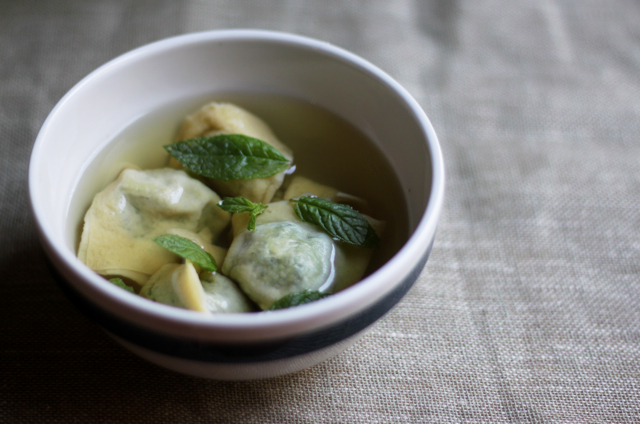
I wanted to try a recipe I had read about for nettle tortellini in brodo, plump little dumplings filled with goats cheese and stinging nettles in a delicious broth made from the nettles themselves. The idea of this dish and the dish itself were so wonderful that I had to share it, with a few small tweaks.
Nature works in funny ways. This standoffish, stinging weed which prickles, scratches, itches and causes rashes, once blanched becomes as gentle and as delicate as a daisy. It is also highly nutritious, rich in all the right vitamins and minerals and has properties that make it good for your circulation, digestive system and – for those who suffer from hayfever and other allergies – ironically it is also a natural antihistamine. It’s also excellent for your skin and hair. It sounds like a wonder-plant and it’s a wonder why we don’t eat weeds more often. It is said that stinging nettles saved much of the peasant population of Europe during and between the two World Wars when fresh vegetables were scarce.
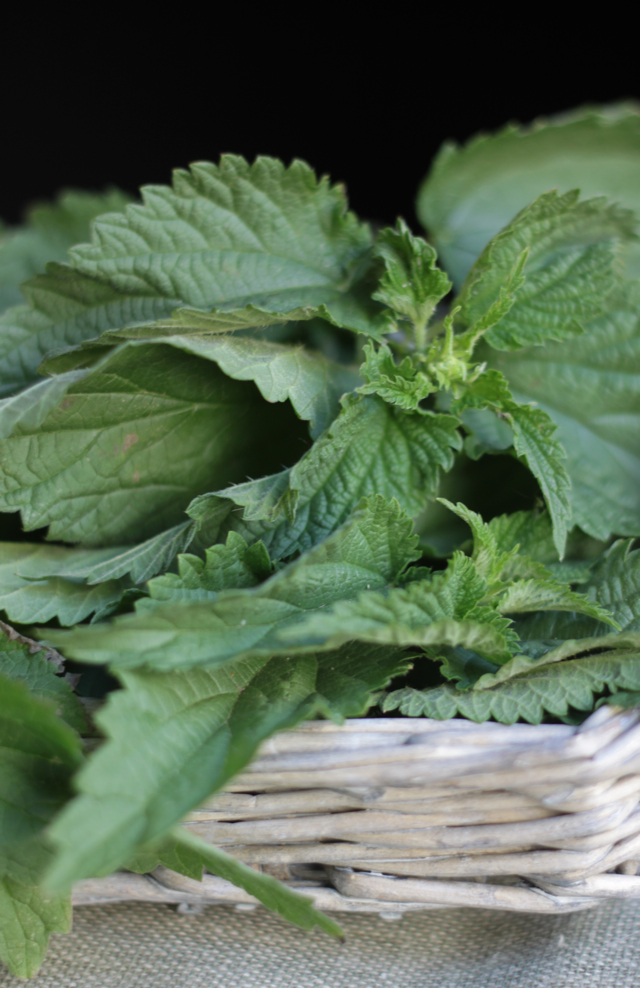
To collect it, make sure you have clothing that covers your arms and legs and wear a nice pair of thick gloves. It’s always best to use stinging nettles before they begin to flower (if you happen to collect them during flowering, avoid the flowers in this dish but you can dry them to make tea). When you’ve gathered them back to your kitchen, pick off the tender leaves (remember – thick gloves!), which are nicer to eat than the bigger, thicker older leaves, rinse them and blanch them quickly in a large pot of boiling water. You want to re-use this water, as it will have become a beautiful infusion that you can use in this dish or even to drink as a herbal tea, so do not throw it down the sink.
Now they can be used exactly like blanched spinach leaves. They are similar in taste, colour and texture to spinach but have a delicate springtime fragrance that reminds me of freshly cut grass and the smell of green apples. Now they are a versatile ingredient to use in hundreds of ways: you can make a pesto, add them to an omelette or frittata, toss it through a farro salad or pasta or even serve it as a side dish. In Bologna, they make green tagliatelle pasta with pureed stinging nettles mixed into the fresh pasta dough, which is served with a meat ragu sauce. In Piemonte in the north of Italy, they make what is known in dialect as Friciulin d’Ortica, little deep-fried dumplings made with nettle leaves, eggs, flour and Parmesan cheese. In this case, we’re going to make a nettle tortellini filling.
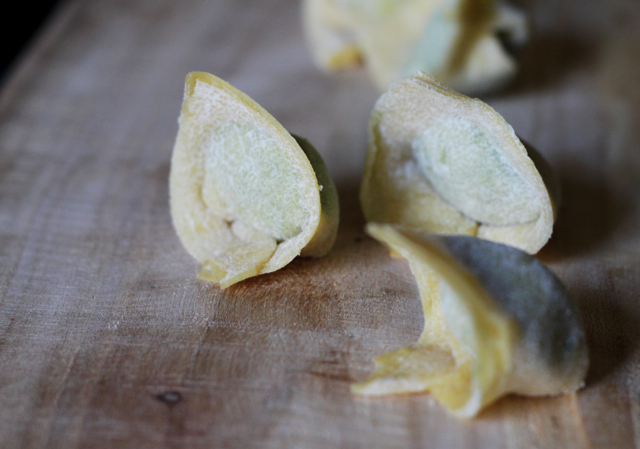
Tortellini in brodo (tortellini in broth) is one of the ultimate Italian comfort foods. It’s also a little out of season in late Spring – it’s a dish normally eaten in the winter. The broth warms any weary soul in the way that only comfort foods can. For this tortellini recipe, the water reserved from blanching the nettles is used together with some chicken broth and flavoured with mint leaves to create a cleansing, light, refreshing base for the seasonal version of this dish. The nettles are made into a filling with pine nuts, ricotta and, to add a bit of bite and extra flavour to this delicate filling, some goats cheese.
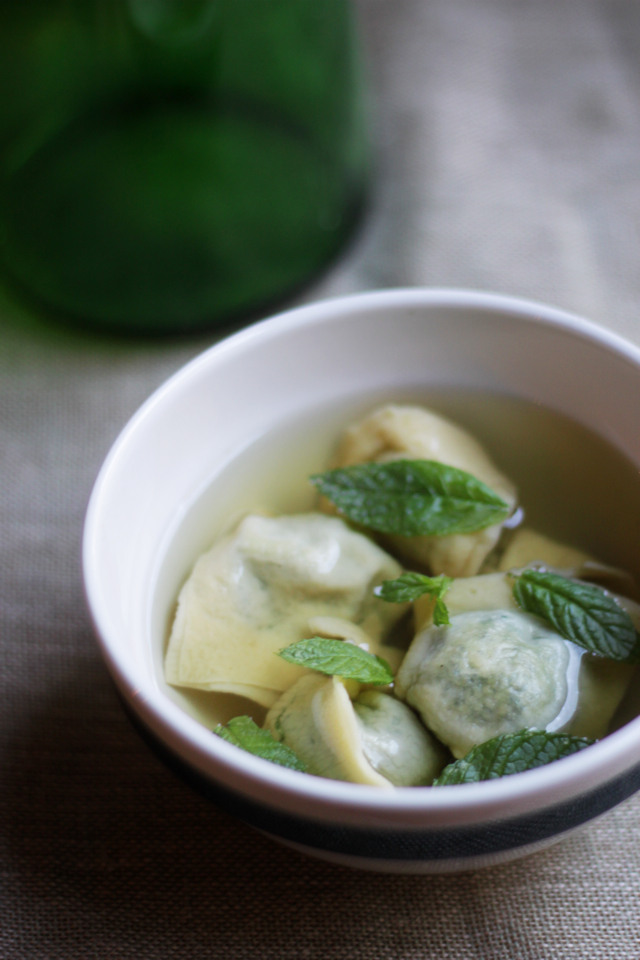
Tortellini di Ortica in brodo
For 4 people as a starter
For the pasta:
- 300 grams of flour
- 3 eggs
- water (for folding)
For the filling:
- 3 packed cups of fresh stinging nettle leaves
- 100 grams of fresh ricotta
- 100 grams of chevre or caprino (goats cheese)
- 30 grams of pine nuts
- salt and pepper
- olive oil
For the broth:
- A handful of whole fresh mint leaves
- Water from blanching the nettles
- Chicken broth
- Grated Parmesan cheese
To make the fresh pasta, make a little “vulcano” of flour on a clean surface and make a well in the centre. Crack your eggs into the well, add a pinch of salt, and with a fork begin gently mixing the eggs, slowly incorporating the flour as you go. When it becomes too thick to work with the fork, begin working with your hands. You may not need all the flour specified, depending on the size of the eggs, the humidity of the day, etc. So as soon as it is workable with hands, you can leave the rest of the flour to the side, as adding too much flour will make it tough. Knead the dough well for about 10 minutes, until it’s beautifully elastic – giving it a poke with your finger, it should simply bounce back. Wrap your dough in plastic and let it rest for about 30 minutes.
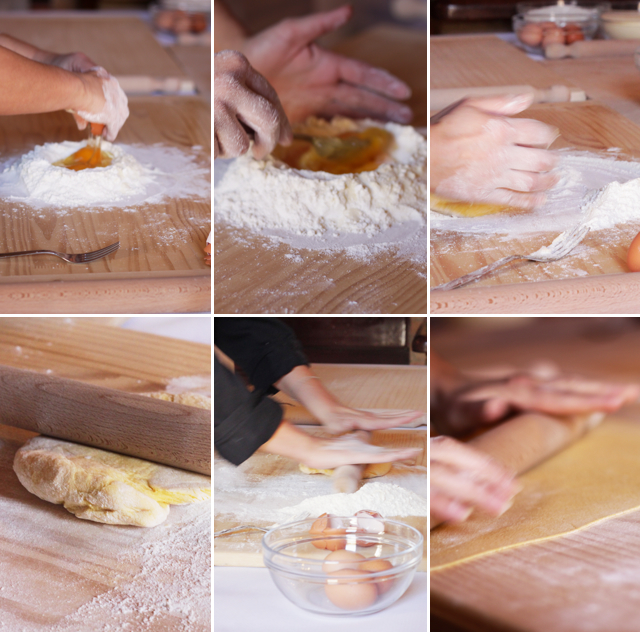
In the meantime, put on a large pot of water to boil and prepare your stinging nettles. Grab a good pair of thick rubber gloves and pick off the best, young leaves from the weeds. Rinse them well and add them to the pot of boiling water with a teaspoon of salt and blanch for about 30 seconds to 1 minute. Reserving the nettle water for later, remove the leaves with a slotted spoon or tongs and rinse them under cold water or plunge them into a bowl full of ice cold water to stop the blanching process.
Add the blanched nettles, pine nuts, ricotta, goats cheese, salt and freshly ground pepper to a food processor or blender and with a drizzle of olive oil, blend to a paste. The mixture should be very thick and easy to handle. Roll teapoon-sized balls of the mixture for your tortellini (damp hands help) and set them aside.
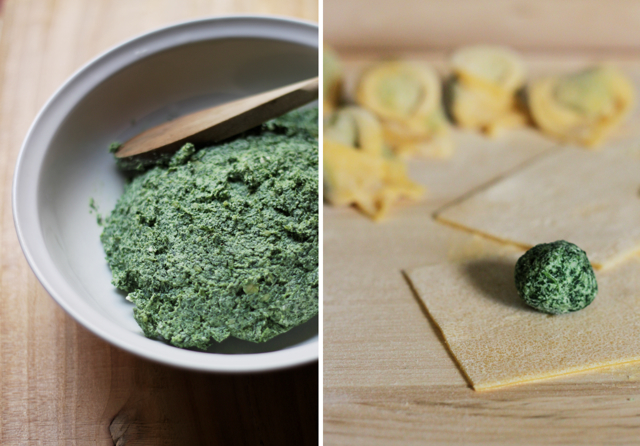
Now it’s time to roll out your pasta. If you have a pasta rolling machine, this is easy. Without one, a trusty rolling pin will be able to do it as well. It will be easier to work in several batches. As the dough can dry out quickly, work one batch at a time, keeping the rest covered. Roll your dough to 1mm thickness or until you can see your fingers through the underside. Cut into 10x10cm squares. Pop a ball of filling in the middle of the square, and with a little bit of water on two of the edges, fold into a triangle and bring the two corners together with another dab of water, like a little man folding his hands on his lap.
Heat equal amounts of chicken stock and reserved nettle water together (you can filter this if you notice any impurities left after blanching the nettles), add salt if needed. When the broth is boiling, add the tortellini and cook for about 2-3 minutes or until they are floating. Divide into bowls and serve with a fresh grating of Parmesan cheese and whole mint leaves.
Original Website: Stinging Nettle Tortellini | Emiko Davies


 English
English  中文
中文